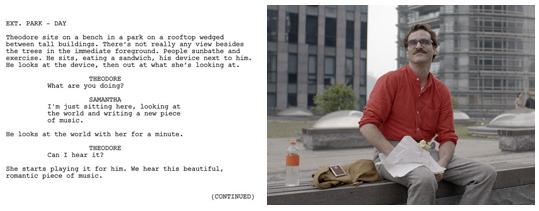2014 Calvin Awards: Best Screenplay
By Reagen Sulewski
February 14, 2014
BoxOfficeProphets.com

The grand champion for this year is Spike Jonze, for his screenplay for Her. While he's known for the strangeness of his directorial efforts, this is only his second screenplay for features, and sees the latest evolution of his whacked-out sensibility. Jonze does an amazing bit of world-building for his futuristic society, where human interaction has devolved to such a degree that falling in love with a computer's operating system seems logical and commonplace. Jonze's script takes this scenario out to its logical conclusions, albeit in surprising ways that make perfect sense in retrospect. There are multiple moments that leave viewers with jaws dropped, astonished at the audacity of what Jonze is doing with the scenario. In some ways this is really a traditional love story, but with an amazing set of twists to get through the core of that genre and find some real truth. It's the kind of insanity that we expect from Jonze, and he delivered in amazing fashion.
Second place goes to the writing team of Richard Linklater, Ethan Hawke and Julie Delpy for Before Midnight, the third film in the Before Sunrise trilogy. The same trio finished fifth for Before Sunset, and in this film, we catch up with Jesse and Celine nine years later, after they've established a family. Settling into domesticity hasn't been easy after the two whirlwind nights of the previous two films. Over the course of a day, the pair see what works and what doesn't in other relationships, suffer a hellacious fight, and try to rediscover what their relationship is all about. It's an unflinching and brutally honest look at how modern relationships function.
Third place goes to John Ridley's (fun fact: the writer of Undercover Brother!) adaptation of 12 Years a Slave. A largely episodic film, it still finds a thematic throughline through Solomon Northup's experiences in being press-ganged into slavery. It is of course, not just about Northup's own experiences, but also does an amazing job of exposing just how vile and corrupting the practice of slavery was to all involved, like a moral sickness that burned all it touched. Few characters are left uncompromised in some way. It would be facile to just write a movie about how slavery is wrong- as who doesn't know that? - but to write a movie that lets the audience see just how it was cultural poison is a stroke of genius.
Disney's latest opus, Frozen, has its script in fourth, written by one of its directors, Jennifer Lee. Loosely adapted from the Hans Christian Andersen fairy tale The Snow Queen (in that both involve snow, and a queen), it flips the lid on the typical Disney playbook to become a tale of female empowerment. It's rare when a movie can fool us into thinking it's one kind of film, and turn around and be its polar opposite, but when it pulls it off to the degree that Frozen does, it's a thing to behold.
The little seen The Spectacular Now, by Scott Neustadter and Michael H. Weber winds up in fifth Following a young, budding alcoholic in his senior year of high school, as he prepares to graduate and do... nothing, more or less, the script sees him bump into his polar opposite – a naive, bookish young girl, also preparing to graduate, but with aims for something bigger than their little Georgia town. The two seemingly mismatched teens start a romance and find that they suit each other's weaknesses perfectly, and help each other grow beyond the suffocating boxes they've been put into by others around them. It's a remarkably assured and cliche-busting script, which digs deep into those difficult days in the transition from adolescence to adulthood.
Terence Winter's script for The Wolf of Wall Street places sixth, with just two points separating it from fourth spot. This tale of financial debauchery takes us deep into the amoral world of a stock broker intent on cheating his way to the top. More than just a wild ride, it shows us how when the rules are gone and money is the object, nothing is ever enough.
Seventh goes to Bob Nelson's script for Nebraska, which at heart is a father-son story, but also peeks into the world of taciturn mid-westerners. With both affection and a bit of judgment of its subjects, and at turns both hilarious and touching, it's a complicated portrayal of uncomplicated people.
Alfonso Cuarón's script for Gravity is our eighth pick for screenplay. While the visuals carry most of the story for this movie, it's the screenplay that keeps this from being just a special effects extravaganza. Smartly paced to give the audience a break from time to time, it's the unsung hero of the movie.
In ninth, we have the Coen Brothers' Inside Llewyn Davis screenplay, which with its complicated structure and broad characters, is a trademark mix of comedy and drama that is much a statement about the creation of art as it is an attempt to entertain.
Lastly, comedian Steve Coogan makes our list in tenth, for his script for Philomena. A true telling of a journalist's attempt to reunite a mother with her son that was taken from her, combines charm, comedy and heart in a perfect mix.
2014 Calvin Awards
Calvins Intro
Best Actor
Best Actress
Best Album
Best Cast
Best Character
Best Director
Best Overlooked Film
Best Picture
Best Scene
Best Screenplay
Best Supporting Actor
Best Supporting Actress
Best TV Show
Best Use of Music
Best Videogame
Breakthrough Performance
Worst Performance
Worst Picture